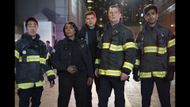The ninth season of 9-1-1 is almost here. October brings new episodes, but the conversation still circles back to what happened in the season 8 finale. Bobby Nash died. Peter Krause, part of the show since day one, left in a way that changed the entire tone. It caught viewers off guard and became a turning point for a story that had always leaned on familiar faces to hold the center.
This feels important because 9-1-1 has always walked a strange line. The disasters were big, sometimes even absurd, yet the group at the core stayed steady. Bobby was part of that steady frame. Removing him broke the pattern. It turned something that felt safe into something more uncertain. That shift is now the backdrop for everything coming next.
The choice to kill Bobby
Killing Bobby marked the first time the show wrote out an original cast member. Tim Minear, co-creator and showrunner, explained why. The emergencies shown each week needed real stakes, he said, and without consequences, the tension could lose weight. For some, that was convincing. For others, not at all. Online reactions included frustration and even calls for a boycott, with fans pointing out that the show had never been about harsh realism. It was about connection, about staying with characters through every impossible rescue.

Oliver Stark’s response
Oliver Stark spoke about the backlash at ABC’s End of Summer Soirée. Playing Evan “Buck” Buckley, he addressed the emotions directly. He said the intention was to make the audience feel hurt, angry, and invested. In his words, that pain shows the story is working. He compared it to a roller coaster: some episodes lift, others drop, but the ride is what matters.
What changes for 9-1-1 on screen
Without Bobby, Station 118 looks different. He was the captain, the guide, the figure who held the team together. His absence is more than symbolic; it changes how the group moves forward. 9-1-1 has always mixed high-risk calls with the bonds that kept the crew grounded. Now, that balance has shifted. The show is entering new territory, whether fans are ready or not.

Fans and the bigger debate
Reactions have focused on more than just one death. What kind of show is 9-1-1 meant to be? Some thought of it as a comfort series. Disasters came and went, but the central cast remained whole. Bobby’s exit broke that idea. Comparisons were made to other television shocks, like Buffy the Vampire Slayer or Succession, where a sudden loss changed everything that followed. The same question now hangs over 9-1-1.
The challenge
The writing faces a test. Will the story explore the absence in a way that feels meaningful? Or will it move on quickly, treating it as just another plot point? The answer shapes how the later years of the show will be remembered. What is certain is that Bobby’s death cannot simply fade; it is already too significant.

Season 9 outlook
Season 9 premieres October 9 at 8 p.m. on ABC. Early notes point to the absence of Bobby staying present, not just being mentioned once and forgotten. No replacement for the captain has been named. The chair is empty, and the series seems set to let that absence speak for itself for now. Emergencies will continue to be staged on a large scale, but the memory of Bobby is expected to linger over every call.
Closing thought
Bobby Nash’s death stands as a major break in the history of 9-1-1. Oliver Stark described it as intentional, as a way to pull the audience through harder emotions. Season 9 will reveal if that choice builds new layers into the story or if it remains a decision remembered for dividing the fan base. Either way, the show enters its new chapter with a different shape, and there is no going back, only the challenge of seeing how long this new rhythm can hold and whether it feels true.
